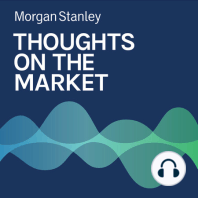3 min listen

2023 Global Macro Outlook: A Different Kind of Year
2023 Global Macro Outlook: A Different Kind of Year
ratings:
Length:
11 minutes
Released:
Nov 16, 2022
Format:
Podcast episode
Description
As we look ahead to 2023, we see a divergence away from the trends of 2022 in key areas across growth, inflation, and central bank policy. Chief Cross Asset Strategist Andrew Sheets and Global Chief Economist Seth Carpenter discuss.----- Transcript -----Andrew Sheets: Welcome to Thoughts on the Market. I'm Andrew Sheets, Morgan Stanley's chief cross-asset strategist. Seth Carpenter: And I'm Seth Carpenter, Morgan Stanley's global chief economist. Andrew Sheets: And on the special two-part episode of the podcast, we'll be discussing Morgan Stanley's Global Year Ahead outlook for 2023. Today, we'll focus on economics, and tomorrow we'll turn our attention to strategy. It's Tuesday, November 15th at 3 p.m. in London. Seth Carpenter: And it's 10 a.m. in New York. Andrew Sheets: So, Seth I think the place to start is if we look ahead into 2023, the backdrop that you and your team are forecasting looks different in a number of important ways. You know, 2022 was a year of surprisingly resilient growth, stubbornly high inflation and aggressively tightening policy. And yet as we look ahead, all three of those elements are changing. I was hoping you could comment on that shift broadly and also dig deeper into what's changing the growth outlook for the global economy into next year. Seth Carpenter: You're right, Andrew, this year, in 2022, we've seen growth sort of hang in there. We came off of last year in 2021, a super strong year for growth recovering from COVID. But the theme this year really has been a great deal of inflation around the world, especially in developed markets. And with that, we've seen a lot of central banks everywhere start to raise interest rates a great deal. So what does that mean as we end this year and go into next year? Well, we think we'll start to see a bit of a divergence. In the developed market world where we've seen both a lot of inflation and a lot of central bank hiking, we think we get a great deal of slowing and in fact a bit of contraction. For the euro area and for the U.K, we're writing down a recession starting in the fourth quarter of this year and going into the beginning of next year. And then after that, any sort of recovery from the recession is going to be muted by still tight monetary policy. For the US, you know, we're writing down a forecast that just barely skirts a recession for next year with growth that's only slightly positive. That much slower growth is also the reflection of the Federal Reserve tightening policy, trying to wrench out of the system all the inflation we've seen so far. In sharp contrast, a lot of EM is going to outperform, especially EM Asia, where the inflationary pressures have been less so far this year, and central banks, instead of tightening aggressively to get restrictive and squeeze inflation out, they're actually just normalizing policy. And as a result, we think they'll be able to outperform. Andrew Sheets: And Seth, you know, you mentioned inflation coming in hot throughout a lot of 2022 being one of the big stories of the year that we've been in. You and your team are forecasting it to moderate across a number of major economies. What drives a change in this really important theme from 2022? Seth Carpenter: Absolutely. We do realize that inflation is going to continue to be a very central theme for all sorts of markets everywhere. And the fact that we have a forecast with inflation coming down across the world is a really important part of our thesis. So, how can we get any comfort on the idea that inflation is going to come down? I think if you break up inflation into different parts, it makes it easier to understand when we're thinking about headline inflation, clearly, we have food, commodity prices and we've got energy prices that have been really high in part of the story this year. Oil prices have generally peaked, but the main point is we're not going to see the massive month on month and year on year increases that we were seeing for a lot of thi
Released:
Nov 16, 2022
Format:
Podcast episode
Titles in the series (100)
Mike Wilson: Are U.S. Economic Indicators Flashing Yellow? by Thoughts on the Market